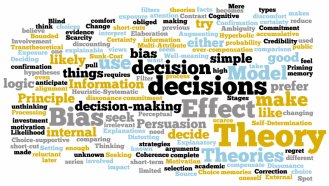Decision making theories for the curious
 With decisions touching everything we do, there is an overwhelming number of decision making theories and related research. Most of these theories have been developed during the twentieth century even though humans have been making judgments with uncertainty for millennia. Decision making models continue to evolve to address more complex situations, and cognitive psychologists are rapidly learning more on how we think. This should lead to decision making theories that could improve the decisions we make, and for the curious, you will find a number of interesting paradoxes and conclusions that reveal the difficulties we all face in trying to make good choices.
With decisions touching everything we do, there is an overwhelming number of decision making theories and related research. Most of these theories have been developed during the twentieth century even though humans have been making judgments with uncertainty for millennia. Decision making models continue to evolve to address more complex situations, and cognitive psychologists are rapidly learning more on how we think. This should lead to decision making theories that could improve the decisions we make, and for the curious, you will find a number of interesting paradoxes and conclusions that reveal the difficulties we all face in trying to make good choices.
Research on decision making theories comes from two key viewpoints
 If you are a person that enjoys models and mathematics, you will enjoy a large body of decision making theory research that comes from the view that we act to make optimal, or alternatively, rational decisions. Theories coming from this point of view generally assume an ideal decision maker that seeks to make the best decision by becoming fully informed and able to compute with perfect accuracy, with full alignment to a defined set of goals. This area of theories is focused on addressing the question of "What should we do?", and models and mathematics are applied to problems of improving and characterizing the uncertainty of the information (probabilities) in order to improve the likelihood of a good decision outcome. While in reality, no one is an ideal decision maker, those subscribing to this perspective attempt to move closer to the ideal by building on facts where available, and applying mathematics and computing to help address risk and uncertainty.
If you are a person that enjoys models and mathematics, you will enjoy a large body of decision making theory research that comes from the view that we act to make optimal, or alternatively, rational decisions. Theories coming from this point of view generally assume an ideal decision maker that seeks to make the best decision by becoming fully informed and able to compute with perfect accuracy, with full alignment to a defined set of goals. This area of theories is focused on addressing the question of "What should we do?", and models and mathematics are applied to problems of improving and characterizing the uncertainty of the information (probabilities) in order to improve the likelihood of a good decision outcome. While in reality, no one is an ideal decision maker, those subscribing to this perspective attempt to move closer to the ideal by building on facts where available, and applying mathematics and computing to help address risk and uncertainty.
 The second area of research for decision theories explores the question "What do we do?" when making choices. Much of the research in this area comes from the study of problem solving by cognitive psychologists seeking to understand how we think. As you might imagine, there are a number of interesting decision making behaviors and paradoxes that have been exposed and characterized that are inconsistent with rational decision making thought processes. A noted example is the Ellsburg paradox that concludes people favor definite information over uncertain information, in other words, the devil they do know versus the one they don't know.
The second area of research for decision theories explores the question "What do we do?" when making choices. Much of the research in this area comes from the study of problem solving by cognitive psychologists seeking to understand how we think. As you might imagine, there are a number of interesting decision making behaviors and paradoxes that have been exposed and characterized that are inconsistent with rational decision making thought processes. A noted example is the Ellsburg paradox that concludes people favor definite information over uncertain information, in other words, the devil they do know versus the one they don't know.
Of course, there are decision making theories that do go beyond these two viewpoints. These theories may challenge some generally accepted principles but are seeking to resolve some of the problems that are inadequately addressed with current theories. Some of these issues include:
- People may have uncertain aspirations that vary based on decision context.
- Existing theory doesn't adequately deal with outcomes that are fulfilled over time.
- Decision complexity is such that it is too difficult to determine optimal behavior.
- Probability theory and rules may not be sufficiently robust to errors in assumptions.
- Current theory places focus on the area of knowledge of "what we know we don't know" instead of "what we don't know we don't know". This argument is well described as the ludic fallacy in Nassim Taleb's book, The Black Swan.
Resources for more on Decision Making Theories
There are a vast number of decision making theory resources available that can address your specific interest.
For those looking to address critical decision making problems, we would suggest starting with theories for rational decision making that you can find at Wikipedia.org. This article provides a good summary of a number of theories, along with references for further investigation.
If you are more curious about topics related to "what we do" when making decisions, an excellent set of articles can be found at ChangingMinds.org. A number of specific decision making thinking behaviors are addressed, along with ways to use or defend against these behaviors. Supporting and additional resources are also provided.
Another resource that can support a number of decision making activities associated with uncertainty is Econport.org. Teaching modules, experiments, software tools, and cataloged resources are provided.
What can we learn from all this research?
There is an overwhelming amount of research on making decisions coming from a number of viewpoints. These range from trying to help us with approaches that ideally move us toward our goals, personally and in organizations, to dealing with practical limitations of our knowledge and how we think.
Our goal at Decision Innovation is to provide a decision making process and model that helps to capture and use knowledge in pursuit of better decision making. Our model enables us to adapt and incorporate the best learning from decision making theories in a way that supports application to our most valued decisions. It is ultimately about creating knowledge through a set of connected decisions that we can use to better realize our potential and reach our aspirations.
Return from Decision Making Theories to Decision Making Activities

